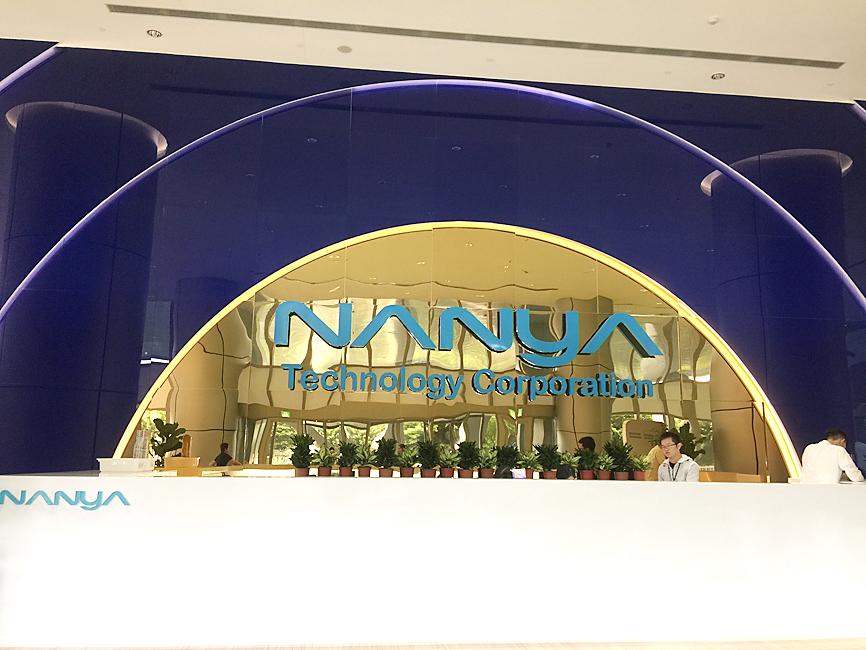DRAM chipmaker Nanya Technology Corp (南亞科技) expects selling prices this quarter to edge downward by a single-digit percentage or remain flat from last quarter as Russia’s invasion of Ukraine and China’s COVID-19 lockdowns add to market uncertainty and dim business prospects.
As Russia’s war against Ukraine prompted raw material costs and shipping fees to surge, and concern has grown over rising inflation, placing a dent in consumer demand for electronics such as TVs, Nanya Technology president Lee Pei-ing (李培瑛) told an online media briefing yesterday.
“On the demand side, smartphone demand did slow a bit. Consumer notebook computers were also affected. High inflation and weaker consumer spending were likely the reasons. Seasonal factors were also behind the slowdown,” Lee said.

Photo: Grace Hung, Taipei Times
Demand for DRAM chips used in cloud-based servers, commercial laptops and gaming computers remains solid, he said.
“From prices in April, it looks like any price decline in the second quarter will be smaller, or even flat, compared with the first quarter,” Lee said. “But, there is a lot of uncertainty. We need to look at the market situation month by month for the rest of the quarter.”
Overall, DRAM prices this quarter are likely to dip by a low single-digit percentage on a quarterly basis, or remain unchanged, after a 5 percent decline in DRAM prices in the first quarter, Lee said.
Before the war, Nanya Technology expected a robust rebound in prices and estimated that DRAM prices would begin to climb in the second quarter.
However, the firm’s shipments in this quarter are likely to resemble the first quarter’s, Lee said yesterday.
The war in Ukraine has not had a significant effect on the company’s chip shipments due to its small exposure to Russia and Ukraine, Nanya Technology said, adding that it suspended shipments to Russia after it invaded its neighbor on Feb. 24.
The lockdown in Shanghai is bringing challenges to the whole supply chain, as customers try to find solutions to transport restrictions in China, Lee said, adding that the lockdown has made it difficult to transport goods in and out of the city.
Lee added that some customers had said that the curbs could remain in place until Monday next week in some districts of Shanghai.
Some customers have destined deliveries to Chongqing, a manufacturing hub for notebook computer makers, or even to Thailand, he said.
Nanya Technology yesterday posted NT$6.55 billion (US$225.47 million) in net profit for last quarter, up 1.5 percent quarter-on-quarter from NT$6.45 billion. That represented annual growth of 142 percent from NT$2.7 billion.
Earnings per share last quarter rose to NT$2.11 from NT$2.08 a quarter earlier and NT$0.88 a year earlier, while gross margin fell for a third straight quarter to 31.4 percent from 37.5 percent in the first quarter.
Construction of a 12-inch fab is to be postponed by two to three quarters due to red tape, Nanya Technology said, adding that the fab would likely begin mass production in 2025, not 2024.
The firm has this year budgeted NT$28.4 billion in capital spending to fund construction and expand capacity, and manufacture its first 10-nanometer class of chips — “10-nanometer class” includes using 10-nanometer to 20-nanometer advance process technologies.

In Italy’s storied gold-making hubs, jewelers are reworking their designs to trim gold content as they race to blunt the effect of record prices and appeal to shoppers watching their budgets. Gold prices hit a record high on Thursday, surging near US$5,600 an ounce, more than double a year ago as geopolitical concerns and jitters over trade pushed investors toward the safe-haven asset. The rally is putting undue pressure on small artisans as they face mounting demands from customers, including international brands, to produce cheaper items, from signature pieces to wedding rings, according to interviews with four independent jewelers in Italy’s main

Japanese Prime Minister Sanae Takaichi has talked up the benefits of a weaker yen in a campaign speech, adopting a tone at odds with her finance ministry, which has refused to rule out any options to counter excessive foreign exchange volatility. Takaichi later softened her stance, saying she did not have a preference for the yen’s direction. “People say the weak yen is bad right now, but for export industries, it’s a major opportunity,” Takaichi said on Saturday at a rally for Liberal Democratic Party candidate Daishiro Yamagiwa in Kanagawa Prefecture ahead of a snap election on Sunday. “Whether it’s selling food or

CONCERNS: Tech companies investing in AI businesses that purchase their products have raised questions among investors that they are artificially propping up demand Nvidia Corp chief executive officer Jensen Huang (黃仁勳) on Saturday said that the company would be participating in OpenAI’s latest funding round, describing it as potentially “the largest investment we’ve ever made.” “We will invest a great deal of money,” Huang told reporters while visiting Taipei. “I believe in OpenAI. The work that they do is incredible. They’re one of the most consequential companies of our time.” Huang did not say exactly how much Nvidia might contribute, but described the investment as “huge.” “Let Sam announce how much he’s going to raise — it’s for him to decide,” Huang said, referring to OpenAI

The global server market is expected to grow 12.8 percent annually this year, with artificial intelligence (AI) servers projected to account for 16.5 percent, driven by continued investment in AI infrastructure by major cloud service providers (CSPs), market researcher TrendForce Corp (集邦科技) said yesterday. Global AI server shipments this year are expected to increase 28 percent year-on-year to more than 2.7 million units, driven by sustained demand from CSPs and government sovereign cloud projects, TrendForce analyst Frank Kung (龔明德) told the Taipei Times. Demand for GPU-based AI servers, including Nvidia Corp’s GB and Vera Rubin rack systems, is expected to remain high,